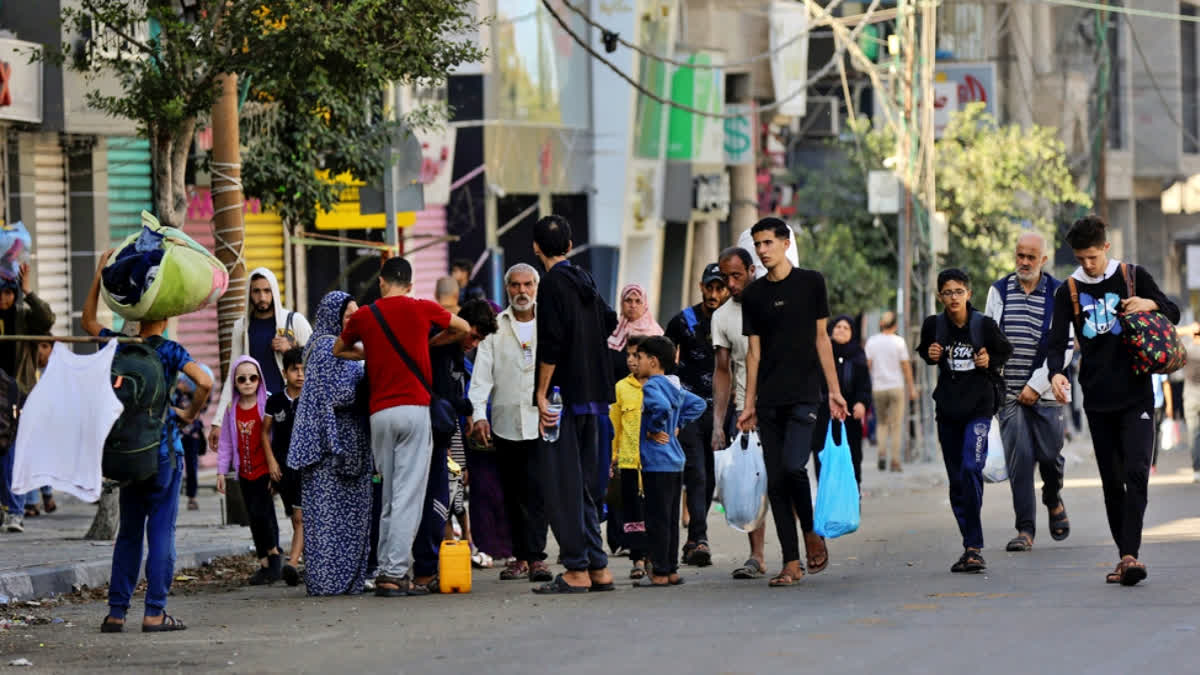New Delhi:To “pause” or to “cease fire” for humanitarian reasons? Therein lies the dilemma with the UN Security Council (UNSC) in adopting a resolution to provide humanitarian aid to the beleaguered people of war-torn Gaza.
While the US is calling for a “humanitarian pause” during the ongoing war between Israel and the Palestinian militant group Hamas, other countries in the 15-member Council are seeking a “humanitarian ceasefire” to provide relief to the civilians in Gaza. The war, which started after the October 7 Hamas attacks on Israel, has claimed nearly 12,000 lives, over 10,000 of them in Gaza alone.
“We talked about humanitarian pauses and we’re interested in pursuing language on that score,” US Deputy Ambassador Robert Wood was quoted by the Associated Press as telling reporters after a two-hour long meeting on Monday. “But there are disagreements within the council about whether that’s acceptable.”
Wood’s comments came after UN Secretary-General Antonio Guterres earlier in the day told reporters he wanted an immediate “humanitarian ceasefire” in Gaza. This is the fifth time that the UNSC has failed to adopt a resolution for a truce in Gaza to provide humanitarian relief to Gazans.
On October 16, a Russia-led draft resolution pushed for a humanitarian ceasefire in Gaza, the release of all people taken into captivity since October 7, access to aid and safe evacuation of civilians. While five UNSC members, including China, Russia, and the United Arab Emirates (UAE), voted in favour, France, Japan, the US and the UK voted against it, while six abstained, including Brazil, Ecuador, and Switzerland.
Two days later, a Brazil-led draft resolution proposed “humanitarian pauses” to allow full and unhindered aid into Gaza, the condemnation of violence against all civilians, and the rescission of Israel’s order to Palestinians to evacuate from the north of Gaza to the south. While 12 UNSC member states voted in favour, Russia and the UK abstained, while the US vetoed it.
Then again, on October 25, Russia presented a fresh draft resolution proposing that Israel immediately cancel its evacuation order for Palestinians in northern Gaza. But it did not mention Israel’s “inherent right to self-defence”. While China, Gabon, Russia and the UAE voted in favour, nine countries abstained from voting and the UK and the US vetoed it.
The same day, the US introduced another draft resolution which called for a "humanitarian pause", not a ceasefire, that would allow aid into Gaza. The draft resolution supported the “inherent right of all states” (read Israel here) to self defense, called for compliance with international law, and pushed for Hamas to release all its captives. While 10 nations voted in favour, permanent members Russia and China vetoed it and Brazil and Mozambique abstained.
After the UNSC’s repeated failures in adopting a resolution, the UN General Assembly adopted a resolution on October 26 calling for a humanitarian truce in the war-torn strip of land. While Palestine welcomed the UNGA resolution, Israel dismissed it as “a dark day for the UN and mankind”. But the fact of the matter is UNGA resolutions are non-binding in nature. These can only act as guidance or advisories to the countries or parties concerned.
This is why, more than a UNGA resolution, it is a UNSC resolution that will help restore some amount of peace in Gaza. The UNSC decisions are formal expressions of the will of the Council. In contrast to the decisions taken by the UNGA, those taken by the UNSC are legally binding.
There are 15 members of the UNSC. Five of these — China, France, Russia, the UK and the US — are permanent members. The other 10 are elected by the General Assembly for two-year terms. Member states continue to discuss changes in UNSC membership and working methods to reflect today’s political and economic realities. Decisions of the UNSC require nine “yes” votes. Except in votes on procedural questions, a decision cannot be made if there is a no vote, popularly known as veto, by a permanent member.
Following the UNSC session on Monday, Israeli Prime Minister Benjamin Netanyahu said that his country was willing for “little pauses”. So, what is the difference between “humanitarian pauses” that the US is pitching for and “humanitarian ceasefire” that other countries are calling for?
“A humanitarian pause gives the liberty to the countries to continue the war at their own convenience,” Abhinav Pandya, founder and CEO of the Usanas Foundation think tank, told ETV Bharat. “It is just an ad-hoc arrangement just to supply relief material to civilians. The countries or parties concerned can start the war at any time.” On the other hand, Pandya explained, a “humanitarian ceasefire” is a more long-term arrangement.
“It calls for ceasing of hostilities from all parties concerned,” he said. And this is where the catch lies. The US basically wants to allow Israel to continue the war against Hamas in Gaza. While a majority of the countries in the Global South, as was evident from the UNGA resolution, wants both sides to cease hostilities.
At a webinar on “Should India designate Hamas as a terrorist organization?” organised by Usanas Foundation, Israeli Ambassador to India Naor Gilon said that those people who are calling for a ceasefire are trying to save Hamas. “But we need time to cut off the head of Hamas,” Gilon said. “That is what will demotivate people to take to the path of terrorism.”
Also read:
- Exclusive | India must call for ceasefire, act as negotiator: Palestinian Ambassador as Israel attacks kill over 10,000 in Gaza
- Israeli minister says nuking Gaza 'an option', suspended by Netanyahu
